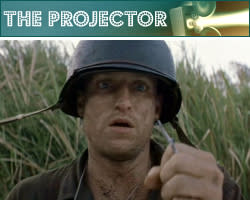Don’t Forget: ‘The Thin Red Line’

We honestly have no idea what audiences are going to make of "The Tree of Life," the new film written and directed by Terrence Malick. Are people going to go because they're big fans of Brad Pitt? If so, this isn't exactly "Mr. & Mrs. Smith" or an "Ocean's Eleven" sequel, and the new movie's philosophical musings and whispered voiceover is bound to annoy some folks who aren't prepared for it. But for better or worse, Malick makes movies that aren't like anything else out there in the world. That was never more apparent than with his 1998 comeback, "The Thin Red Line."
Based on the novel by James Jones, who also wrote "From Here to Eternity," "The Thin Red Line" is a war movie, but for a lot of people it would more accurately be called a "war" movie. Yes, the film was set in Guadalcanal during World War II, but the movie didn't feel like your typical war film: It was as much about nature as it was about combat. Plus, it didn't follow conventions because it didn't seem to have a central character or characters. Instead, we met a lot of different people who came and went over the movie's three-hour running time. (And the most famous actors, like George Clooney, weren't necessarily the ones who were the most prominently featured.)
But at its heart "The Thin Red Line" is about Witt (Jim Caviezel), a private who isn't interested in fighting and instead enjoys having philosophical conversations with his commanding officer, played by Sean Penn, about the nature of war. That's not to say that "The Thin Red Line" is about Witt, though: He's just one participant in Malick's grand-scale examination of how combat separates us from our true selves.
Malick was hardly the first guy to make an anti-war film, but there's never been one quite as thoughtful as "The Thin Red Line." In any other year, it would have been roundly embraced and trumpeted -- although it did receive seven Oscar nominations -- but 1998 was different because five months earlier "Saving Private Ryan" had come out. Now generally considered the best modern-day war film, despite its sappy bookends and some simplistic characters, Steven Spielberg's movie was groundbreaking for its vivid, raw, immediate combat scenes: You can still feel its influence in movies like "Battle: Los Angeles." "Saving Private Ryan" was legitimately shocking and wrenching: Even if you saw the flaws in it, the movie ripped you apart. (I still remember how quiet my sold-out theater was after the movie was over: Nobody was ready to talk about what they'd just experienced.)
In comparison to such an urgent, gritty war film, "The Thin Red Line" struck some as too meandering. And while it's as meditative as Malick's movies always are, "The Thin Red Line" is actually exceptionally tense and stirring, the director unleashing some expert war sequences that, while not as startlingly original as Spielberg's, work so well in concert with the movie's quieter moments when we evesdrop on the thoughts of these soldiers.
But it wasn't just the Spielberg comparison that hurt "The Thin Red Line" at the time. The film was also advertised as Malick's grand return to filmmaking after a 20-year absence, and so its release was burdened with lofty expectations, which no doubt left some to feel unfulfilled by the actual movie. But as his later films ("The New World," "The Tree of Life") have seen his characters take a backseat to his musings, "The Thin Red Line" strikes me as a nice balance of Malick's '70s aesthetic and his modern approach, figuring out a way to tell a great story at the same time as he explores larger themes on a huge canvas. But is it a war film? About as much as "The Tree of Life" is a Brad Pitt film.

